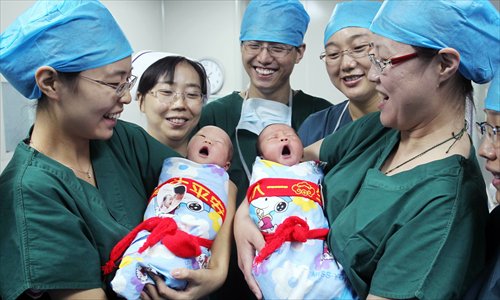HOME >> CHINA
Chinese couples flock to Thailand for cheap IVF, illicit gender selection
Source:Xinhua - Global Times Published: 2016-1-27 20:08:01

Medical staff hold twins born in Xi’an, Northwest China’s Shaanxi Province on August 15, 2012 with the aid of in vitro fertilization. Photo: IC
Many Chinese couples are looking to have a "test-tube" baby in Thailand after China began to allow all couples to have two children.
Besides of the low prices and high success rate of Thai clinics, some have speculated that one major attraction of going abroad is that it makes it easier for parents to choose the gender of their fetus, a practice banned in China.
At the Jetanin Institute for Assisted Reproduction in Bangkok, a Xinhua News Agency reporter noted that at least eight of 10 patients waiting for treatment were Chinese. One of the patients told Xinhua that it was her second trip to Thailand for in vitro fertilization (IVF), after the first procedure failed.
A doctor at the institute revealed that over 70 percent of their clients are from China, which has been the case for several years, and the institute can offer consulting services to at least 200 clients every day.
From January 1 all couples in China are allowed to have two children, following an initial loosening of the one-child policy in 2013. However, the number of couples choosing to have a second child after this earlier decision was lower than authorities predicted.
Several media outlets have pointed out that many couples are reluctant to have a second child partly due to the economic pressure a child can bring.
Meanwhile, more and more Chinese people are infertile, contributing to the market for IVF service.
Statistics released by the China Population Association (CPA) in 2013 revealed that the infertile population of the country has surpassed 40 million, making up 12.5 percent of the total population of childbearing age.
Cheap success
The success rate of IVF procedures in Thailand is around 10 percent higher than that in China, the Guangzhou Daily reported.
The success rate could reach 75 percent for female clients aged between 25 and 28. Although the rate drops over time, it is still higher than other Asian countries, medical staff at Jatanin institute were quoted as saying by Xinhua.
Meanwhile, IVF fees in Thailand are a mere between 80,000 and 100,000 yuan each time - much less than in the West. IVF fees can reach 160,000 yuan in the US.
A bureau director of the Thailand Ministry of Public Health told Xinhua that the Thai government attaches great importance to supervision on medical industry and IVF techniques in Thailand, while voicing hope that Thailand's medical services can help Chinese clients realize their dreams.
Selecting sons
Meanwhile, several insiders in the medical industry pointed out that a great number of Chinese couples travel to Thailand for fetus gender selection, which is banned in China.
Gender selection was banned in 2003, to help correct China's gender imbalance. Data released by the National Bureau of Statistics in January said the ratio of males to females at birth was 113.51 to 100 in 2015.
It has become an open secret in the industry that almost all the medical institutes that offer IVF services in Thailand also provide fetus gender selection and the practice is still common in spite of a Thai goverment crackdown, Xinhua claimed, adding that gender selection has been restricted since 2014 unless a parent carries a hereditary disease.
An online search for Thai IVF gender selection service still yields many results via intermediaries on Chinese search giant Baidu, with many websites boasting of their 100 percent success rate in gender selection.
The number of medical institutes offering IVF services has expanded in Thailand, Xinhua said, adding that there are over 40 institutes like Jatanin in Bangkok alone and a large proportion of their clients are Chinese.
However, data from the Royal Thai College of Obstetricians and Gynecologists - the only agency in the country which gathers specialized information about IVF - showed in 2014 that Thailand only had 44 officially registered IVF clinics in total, with seven new facilities opening last year and two or three applications for new clinics being submitted every month, Reuters reported.
Newspaper headline: Babies made in Bangkok
Posted in: Society